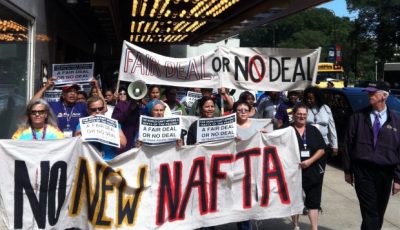NAFTA 2.0: Revising the 1994 Agreement

According to the Wall Street Journal, it’s a “template for deals to come,” adding:
“The new US-Mexico-Canada Agreement (has) implications for agreements beyond North America, including new bilateral deals being contemplated for China, Japan, the European Union, and the UK.”
On Thursday, Mexico’s Senate approved the deal after top North American officials agreed on its terms, ratification by the US and Canada expected in early 2020 — Trump, Canadian Prime Minister Trudeau, and Mexican President Obrador to sign it into law.
Commenting on the deal, Global Trade Watch director Lori Wallach explained the following:
The deal is better than the 2018 US-Mexico-Canada Agreement (USMCA), a jobs-destroying neoliberal ripoff, a corporate coup d’etat, empowering corporate predators at the expense of ecosanity, worker pay, benefits and other rights.
Trade deals, including NAFTA 2.0, are all about maximizing corporate profits, offshoring US jobs to low-wage countries to continue, worker rights steadily eroding.
Still, NAFTA 2.0 “remove(d) Big Pharma giveaways and improve(d) labor and environmental terms” over USMCA’s 2018 provisions, said Wallach, adding:
Despite much in the agreement that’s unacceptable, it’s “better than the original NAFTA.”
Trump’s approval of anti-worker, anti-ecosanity provisions in last year’s USMCA betrayed ordinary Americans he pledged to serve — how he’s governed across the board throughout his time in office, serving corporate and high-net households interests at the expense of the public welfare.
After pledging to seek lower drug prices last year, last year he agreed on “new Big Pharma giveaways that lock in high drug prices and labor and environmental terms that were too weak to stop NAFTA’s original sin of job outsourcing,” said Wallach.
NAFTA 2.0 changes improved some, not all, pro-business, anti-consumer, anti-worker provisions of the 1994 agreement.
“(M)any NAFTA flaws were not fixed,” Wallach stressed. “The best (NAFTA 2.0) feature…is the gutting of Investor-State Dispute Settlement (ISDS).”
It grants corporate predators the right to sue governments for virtually unlimited compensation before a rigged panel of three corporate lawyers – their ruling final, not subject to appeal.
Favorable rulings can be gotten by claiming laws protecting public health or ecosanity violate corporate trade agreement rights.
If a nation refuses to pay, its assets can be seized for compensation. ISDS incentivizes offshoring of jobs by providing special privileges and rights for firms relocating operations abroad – facilitating a global race to the bottom.
Most 1994 NAFTA provisions have nothing to do with trade – everything to do with maximizing corporate profits, compromising ecosanity, worker rights, as well as human health and welfare.
Last year’s signed but not ratified USMCA empowers corporate predators to continue offshoring jobs.
It lets them ignore ecosanity, worker rights, and human health and welfare. ISDS let corporate predators ripoff around $400 million from North American taxpayers.
Wallach: “That a US (NAFTA 2.0) pact largely eliminates extreme ISDS protections for foreign investors and anti-democratic tribunals sends a signal worldwide about the illegitimacy of the ISDS regime.”
Trump’s claim about the deal bringing back hundreds of thousands of new manufacturing jobs is pure rubbish.
At the same time, “labor and environmental standards and enhanced enforcement terms may help raise wages in Mexico, and this may also reduce US corporations’ incentives to outsource US jobs to Mexico to pay workers less,” said Wallach, adding:
NAFTA 2.0 “shows that to be politically viable, trade pacts can no longer include extreme corporate rights like ISDS or new monopoly protections for Big Pharma that have been featured in past US trade deals and that they must have enforceable labor and environmental standards.”
“This is a significant shift after decades of US trade pacts, expanding corporate rights and Big Pharma monopoly protections.”
Wallach may be overly optimistic. Since the neoliberal 90s, worker rights steadily eroded — along with fundamental freedoms and a nation safe and fit to live in.
Policies now pursued by congressional Dems aim to improve their November 2020 electoral prospects.
The Clinton co-presidency was responsible for the original NAFTA. Will Dems today govern differently if control the reigns of government? It’s highly unlikely.
Their pro-endless wars, pro-business, anti-worker, anti-consumer, anti-rule of law record since the 1990s speaks for itself.
Fixing NAFTA falls way short of “negotiating a truly progressive trade agreement from scratch, which would additionally require climate provisions, truly enforceable currency disciplines, and the elimination of limits on consumer protections for food, product safety, the service sector and online platforms,” Wallach stressed.
Unlike the Wall Street Journal’s rosy scenario, “(t)he new NAFTA is not the template for future agreements, but establishes the floor from which we will continue to advocate for a new model of trade and globalization that puts people and the planet first,” she added.
*
Note to readers: please click the share buttons below. Forward this article to your email lists. Crosspost on your blog site, internet forums. etc.
Award-winning author Stephen Lendman lives in Chicago. He can be reached at [email protected]. He is a Research Associate of the Centre for Research on Globalization (CRG)
His new book as editor and contributor is titled “Flashpoint in Ukraine: US Drive for Hegemony Risks WW III.”
http://www.claritypress.com/LendmanIII.html
Visit his blog site at sjlendman.blogspot.com.

